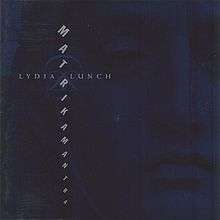Matrikamantra
Matrikamantra is the fourth album by the singer/songwriter Lydia Lunch, released on October 31, 1997 through Crippled Dick Hot Wax!. The first disc is a studio album that contains new material, while the second disc contains a live performance recorded at Palace Acropolis in 1997.
| Matrikamantra | ||||
|---|---|---|---|---|
 | ||||
| Studio album and Live album by | ||||
| Released | October 31, 1997 | |||
| Recorded | Harbinger House, New York March 1, 1997 at Palace Acropolis, Praha, Czech Republic | |||
| Genre | Post-punk | |||
| Length | 96:31 | |||
| Label | Crippled Dick Hot Wax! | |||
| Producer | Lydia Lunch | |||
| Lydia Lunch chronology | ||||
| ||||
Track listing
All lyrics are written by Lydia Lunch; all music is composed by Joseph Budenholzer.
| No. | Title | Length |
|---|---|---|
| 1. | "Need to Feed" | 3:51 |
| 2. | "Inverted Dream" | 2:33 |
| 3. | "Disease of the Night" | 5:45 |
| 4. | "Psychic Anthropology" | 3:46 |
| 5. | "Cesspool Called History" | 5:01 |
| 6. | "Dread" | 4:25 |
| 7. | "Escape" | 2:50 |
| 8. | "Itch" | 2:40 |
| 9. | "Solo Mystico" | 2:46 |
| 10. | "Lethe" | 3:26 |
| 11. | "In Spite of God" | 2:56 |
| 12. | "Archives of Blood" | 2:55 |
| 13. | "Outpatients" | 5:22 |
| No. | Title | Length |
|---|---|---|
| 1. | "Intro/World of Whispers" | 8:30 |
| 2. | "Cesspool Called History" | 5:18 |
| 3. | "Gravediggers of the Future" | 5:45 |
| 4. | "Need to Feed" | 6:36 |
| 5. | "Perfumed Corpses" | 6:29 |
| 6. | "Disease of the Night" | 4:33 |
| 7. | "In Spite of God/Vortex" | 11:12 |
| 8. | "Hermones" | 3:50 |
| 9. | "Dread" | 5:44 |
| 10. | "Outpatients/Exit" | 9:23 |
Personnel
- Harbinger House
- Joseph Budenholzer – sound design
- Joan Dalin – violin
- Paul Geluso – mastering
- Lydia Lunch – vocals
- Laura Rogers – flute
- Greg Shakar – clarinet, mastering
- Live in Praque
- Joseph Budenholzer – sound design
- Tomáš Hadrava – mixing
- Kamilsky – bass guitar, mastering, mixing
- Lydia Lunch – vocals
- Colin Stuart – mastering, mixing
- Mr. Zak – mastering
gollark: Great!
gollark: Want to play rock/paper/scissors?
gollark: I see.
gollark: How big a number do I need?
gollark: It hasn't opened any wormholes into alternate realities.
References
This article is issued from Wikipedia. The text is licensed under Creative Commons - Attribution - Sharealike. Additional terms may apply for the media files.